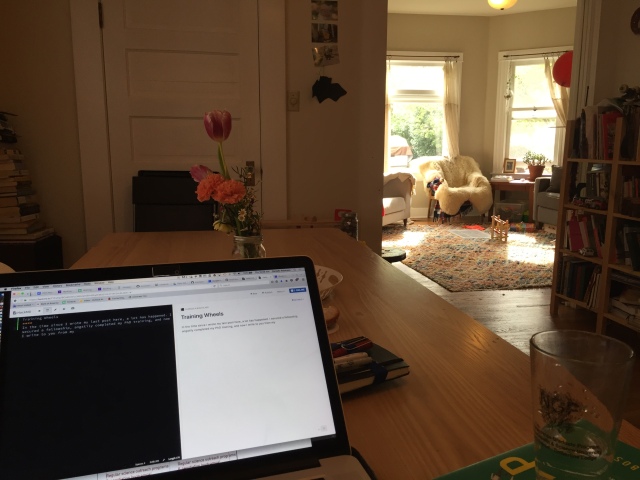In the time since I wrote my last post, a lot has happened. I was forcibly elevated to fifth year PhD candidate status. Then sixth, though I was writing and had an exit strategy when that happened so I noticed it less. I secured a fellowship I thought I’d love, and now I love it. I angstily completed my PhD training, wrote and defended a dissertation, and filed the final edits two weeks ago. And now I write to you from my rather delightful home office (it’s a dining table).  From here on out, I’m unanonymizing myself. Anonymous posting made sense for me when I started writing. (Deep thought: Anonymous posting was training wheels for my writing.) But now it doesn’t seem like I need anonymity to say what’s on my mind. So… Hello! I am Danielle. You can read more about me here, here, here, and check me out on GitHub where I don’t write much code but manage to contribute to a lot of projects anyway.
From here on out, I’m unanonymizing myself. Anonymous posting made sense for me when I started writing. (Deep thought: Anonymous posting was training wheels for my writing.) But now it doesn’t seem like I need anonymity to say what’s on my mind. So… Hello! I am Danielle. You can read more about me here, here, here, and check me out on GitHub where I don’t write much code but manage to contribute to a lot of projects anyway.
I am now a mentor. Mentorship – what a mentor is, what the expectations are on either side, and how to communicate well within a mentor-mentee relationship – has been a challenging issue for me over course of my PhD training. I feel excited and uncertain to be a mentor myself. As a part of the Open Leadership Training Series I am mentoring two projects, Why Not Open Science and NeuroTechEDU. Each project is at a different stage of development. On the surface, the projects are smaller than a PhD, however each has the potential to grow and have a big impact on its community. Each is a science related project, albeit with different audiences (academic researchers and anyone interested in DIY projects to learn more about the brain, respectively). I’m not an expert in either survey research or neurotech / hardware hacking. But as it turns out, I don’t need to be as long as I can show up and listen.
We expect a lot from mentors. We want them to support us and help us develop. We want their time and their availability. We want them to listen. We want them to have feedback that feels useful. In academia, not all who serve as official mentors get training in how to mentor or even how to manage a research group.
I’ve had two very positive and productive relationships with academic mentors and two that were less positive and less productive for everyone. Near the end of my PhD – while I was really struggling with my PhD advisor – I am embarrassed to admit how much angst and emotional processing it took to accept that I would never get the kind of support I felt I needed from that particular PhD mentor. Once I accepted that, I saw that I was getting that support from other mentors – faculty in other departments, my program director, my peers, some cool deans, and others in my professional network. I wish I could go back and tell my past self to chill out and appreciate these other mentors rather than spending energy being angry about the PhD advisor. But I guess we need to learn some things the hard way? Now that it’s in the past, it is easier to see some of the reasons why it went wrong. These experiences with mentors – the good and the less good – have shaped the way I approach mentorship.
I have often lamented that researchers who run labs get no formal mentorship training yet are able to take on PhD students and postdocs. In fact just today, while giving the NINDS Workforce Survey a piece of my mind I snarked, “The ability to write a grant likely does not correlate with the ability to run a group.” And now, I’ve taken my own advice and engaged in a formal mentorship program.
As an Open Leadership Training Series mentor I participated in a mentor training session with Abby Cabunoc Mayes. This half day session was like training wheels for mentoring. We did role playing. We talked about our feelings. We learned how to apply the GROW model in conversation (Goal, Reality, Options, Way Forward). We learned to just listen, ask questions, and let our mentees come to their own conclusions on the options and way forward – without filling up time with our own opinions and ideas.
My new identity as a mentor is about a month old. Participating in the Open Leadership Training Series mentor training, This training has already impacted my communication style. Whenever acronyms designed to help managers come in to play things can get cheesy. But for me, these exercises made my question many of my habits and patterns of communication. I’m inspired by the projects I’m mentoring and feel like I have the support I need to mentor these projects. I’ll keep you posted!
